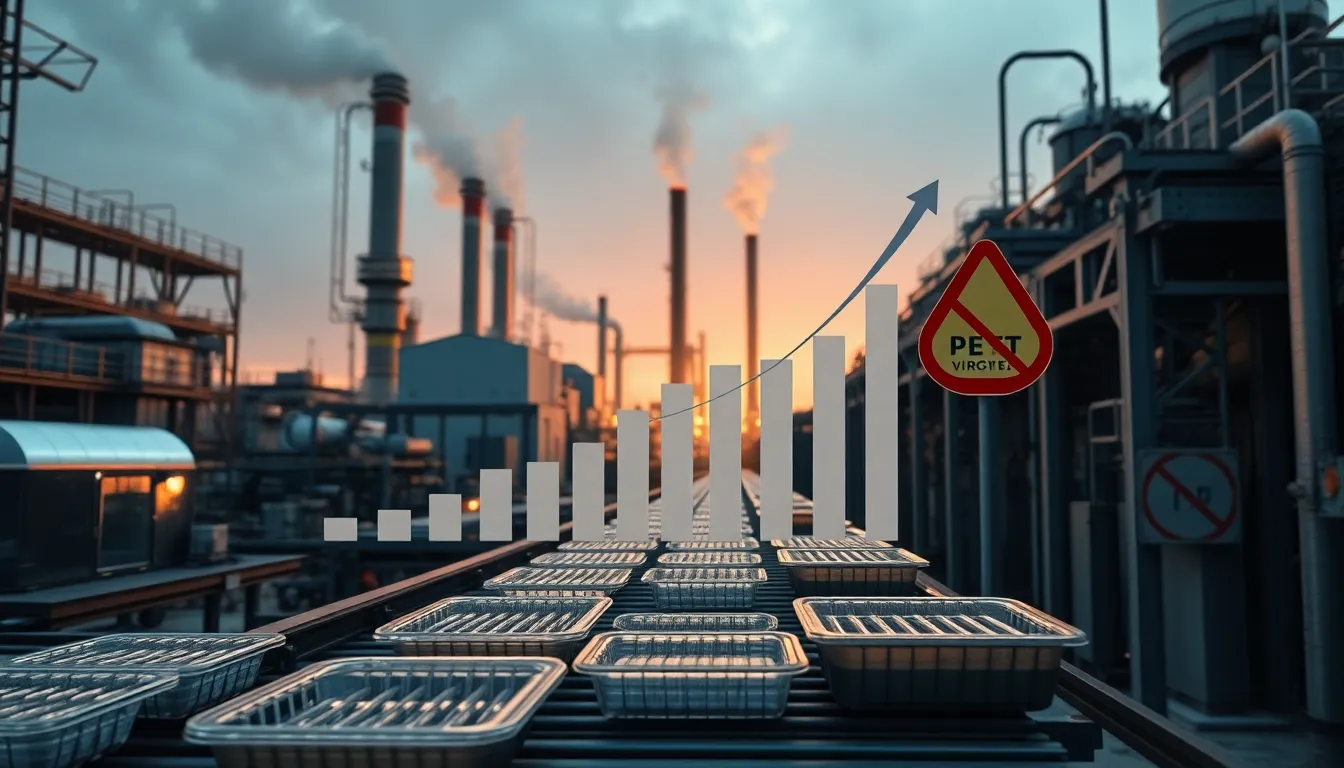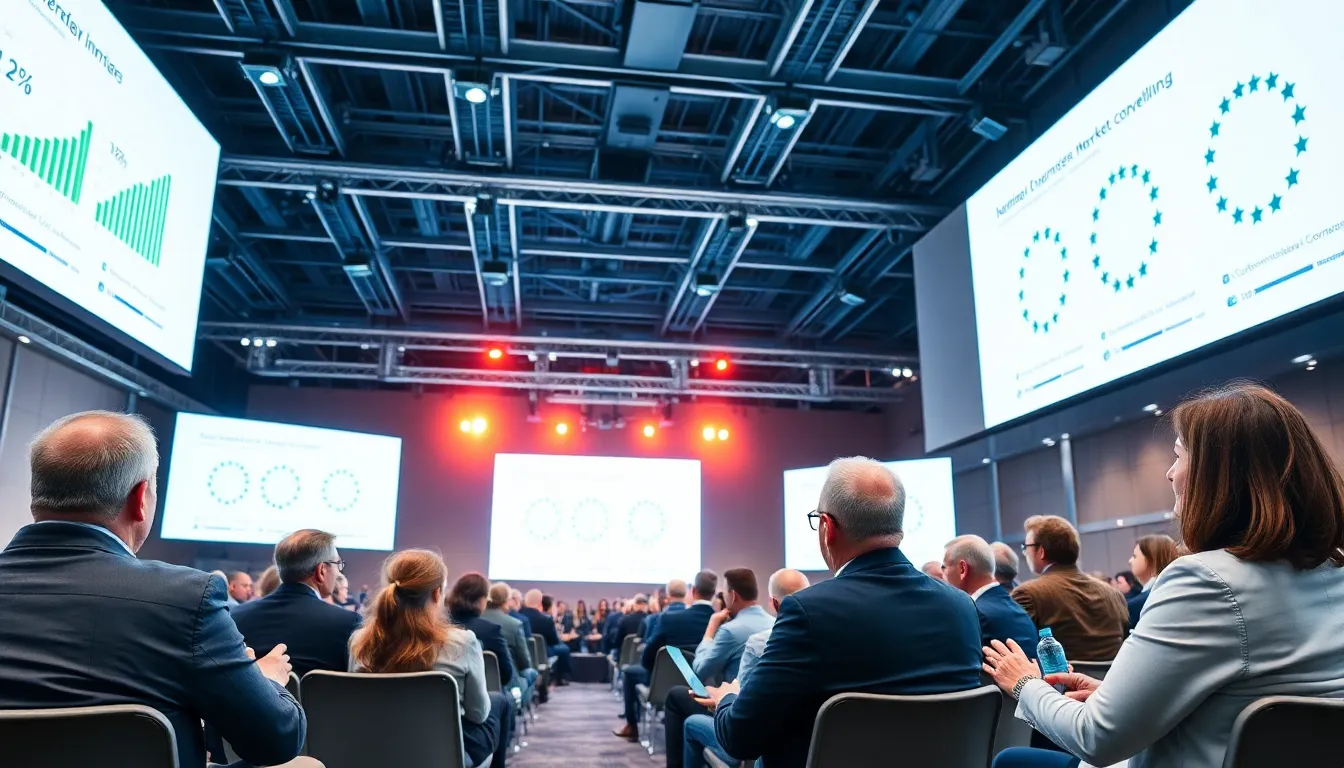Inside the fight to save Europe’s PET industry, producers are confronting an unprecedented economic crisis, severely challenging their global competitiveness. This critical situation is driven by significantly higher feedstock and energy costs, alongside regulatory threats like a proposed 2030 ban on PET trays.
Key Implications
- Cost Inequities: European PET manufacturers face significant cost disadvantages due to virgin feedstock prices being nearly 50% higher than international competitors and recycled waste feedstock costing almost ten times more within the EU, eroding profitability and market competitiveness.
- Regulatory and Market Protection Gaps: The proposed 2030 ban on PET trays for unprocessed fruits and vegetables, coupled with the absence of a specific TARIC code for verifying imported recycled PET content, threatens domestic market segments and undermines fair competition for EU producers.
- Strategic Industry Advocacy: Petcore Europe is leading unified industry efforts, engaging 380 stakeholders and key EU institutions to advocate for policy changes such as a new TARIC code, aligned energy costs, and clear circularity rules to restore competitiveness and safeguard the circular economy for European PET.

EU PET Producers Confront 50% Higher Virgin Feedstock Costs and 2030 Tray Ban
European PET manufacturing is currently grappling with an unprecedented economic crisis, severely impacting its competitive standing on the global stage. The industry faces dual pressures from significantly higher feedstock costs—both virgin and recycled—compared to international markets. Virgin PET feedstock in Europe costs almost 50% more than what Chinese manufacturers pay, while waste feedstock for recycling can be up to ten times pricier within the EU. This challenging environment is further exacerbated by a proposed EU ban on PET trays by 2030 and persistent high energy costs, intensifying the fight to save Europe’s PET industry.
Escalating Cost Disparities in PET Feedstocks
The cost of raw materials presents a major hurdle for European PET producers. Chinese manufacturers, for instance, benefit from cheap oil, acquiring virgin feedstock at almost 50% of the price Europeans pay. This dramatic cost difference allows international competitors to produce PET at a significantly lower base cost, making it incredibly difficult for European companies to compete on price, particularly in global export markets.
The situation is equally dire for recycled PET (rPET). Waste feedstock, which is crucial for building a circular economy within the EU, costs almost 10 times less outside of the EU than within it. This disparity disincentivizes investments in European recycling infrastructure and makes locally produced rPET less competitive. The high cost of sourcing and processing recycled materials directly undermines the EU’s sustainability goals and the viability of domestic recycling operations, forcing producers to contend with inflated input costs.
Beyond feedstock economics, the European PET industry is confronting significant regulatory threats. Under current EU plans, PET trays are facing a proposed ban by 2030 for ‘unprocessed fruit and vegetables’. This regulation, aimed at reducing packaging waste, poses a direct threat to a significant segment of the PET packaging market, despite the material’s inherent recyclability.
The industry is actively working to demonstrate the full recyclability and reusability of PET trays, arguing that a blanket ban overlooks the material’s potential within a circular economy framework. Proponents emphasize that PET trays, when properly collected and processed, can be endlessly recycled into new trays or other high-value products. This pushback highlights the industry’s commitment to proving its environmental credentials and securing a future for PET packaging in food applications.
External Economic Factors: Trade Policies and Energy Prices
International trade policies also play a critical role in shaping the competitive landscape for European PET producers. For example, the US recently imposed a 50% duty on certain materials originating from India. Such duties can significantly alter global trade flows, potentially redirecting cheaper imports from countries like India to the EU market. This influx of lower-cost alternatives could further depress prices and erode profit margins for local manufacturers, adding another layer of complexity to the existing challenges facing the European PET industry.
Adding to these external pressures are the consistently high energy costs within the EU27. The cost of energy is deemed “too high” by industry stakeholders and urgently needs to be better aligned with costs outside of Europe. Energy-intensive manufacturing processes, such as those involved in virgin PET production and recycling, become economically unsustainable when energy prices remain elevated. This directly threatens the viability of local PET manufacturing operations, leading to potential factory closures and job losses if not addressed. Investing in recycled PET production expansion initiatives in other regions underscores the global nature of these economic pressures and the critical need for Europe to create a more competitive environment for its domestic industry.

Petcore Europe Unites 380 Industry Stakeholders to Advocate for Circularity Safeguards
Inside the fight to save Europe’s PET industry, Petcore Europe stands at the forefront, actively engaging with key EU institutions. This vital advocacy aims to address rising economic and regulatory challenges, ultimately restoring competitiveness. The organization recently fostered significant collaboration, evidenced by 380 attendees at its 2025 annual conference. This major gathering underscored the industry’s collective commitment to championing crucial policy changes for sustainable growth.
Petcore Europe’s efforts are directed towards implementing clear rules for circularity. They also focus on aligning energy costs across the sector. A primary objective involves the urgent introduction of a new TARIC code. This code is essential for accurately verifying imported recycled PET (rPET) content. Such verification is critical to ensuring fair competition and upholding environmental standards within the EU market.
Driving Policy Changes for Fair Circularity
The introduction of a new TARIC (Integrated Tariff of the European Communities) code is a cornerstone of Petcore Europe’s current lobbying initiatives. This specific customs code would enable the precise identification and tracking of imported recycled content. Currently, the absence of such a code makes it challenging to verify the authenticity and quality of imported rPET. This gap potentially undermines the European circular economy and disadvantages domestic producers.
Petcore Europe is in active discussions with DG TAXUD (Directorate-General for Taxation and Customs Union) regarding this crucial TARIC code. These engagements are vital to creating a level playing field for domestic producers. Beyond customs specifics, the organization also dialogues with DG GROW (Directorate-General for Internal Market, Industry, Entrepreneurship and SMEs) and DG ENV (Directorate-General for Environment) on broader issues. These discussions cover comprehensive policy frameworks for circularity and competitive energy pricing. Both are critical for Europe’s PET industry to thrive.
Annual Conferences: Catalysts for Collaboration and Innovation
Petcore Europe’s annual conference serves as a vital platform for industry stakeholders. It facilitates critical discussions, encourages the sharing of innovations, and fosters essential networking opportunities. The 2025 event, drawing 380 attendees, clearly demonstrated the significant engagement and collective determination of the sector. Participants included converters, brand owners, recyclers, and policymakers, all committed to shaping the future of PET.
Innovation remains a central pillar of these gatherings. The 2026 conference will mark the third year for calls for papers on innovative projects and developments. This ongoing emphasis on research and advancement helps drive the industry forward. The core theme for the 2026 Petcore conference reinforces this drive: “the need to restore European competitiveness for our industry.” Such events are crucial for identifying and disseminating best practices across the value chain.
During these conferences, participants explore new technologies and sustainable practices. Discussions often revolve around investment in advanced recycling facilities and enhanced collection systems. For instance, initiatives like recycled PET production expansion are vital topics. These dialogues ensure the industry remains agile and responsive to evolving market demands and environmental mandates. They also provide a forum to discuss challenges and potential solutions for increased material circularity.
Aligning with Europe’s Competitiveness Agenda
Petcore Europe’s comprehensive efforts align closely with key recommendations from Prof. Draghi’s report on EU competitiveness. The organization advocates for swift action from EU institutions to implement policies that strengthen the European industrial base. This includes securing quality protection for domestic PET production. Such measures are essential to safeguard European jobs and ensure environmental integrity within the bloc.
The focus on verified recycled content and fair market conditions directly supports the report’s call for a more robust and resilient European economy. By pushing for a new TARIC code and harmonized energy costs, Petcore Europe helps ensure that domestic producers are not disadvantaged. This strategic advocacy is integral to the broader objective of fostering a sustainable and competitive circular economy within the EU. Ultimately, these actions contribute significantly to securing the future viability of Europe’s PET industry.
Featured image generated using Flux AI
EU PET Producers Confront 50% Higher Virgin Feedstock Costs and 2030 Tray Ban
Key Message: European PET manufacturing faces significant economic strain from virgin feedstock costing almost 50% more and recycled feedstock up to ten times more than international markets, exacerbated by a proposed EU ban on PET trays by 2030 and high energy costs.
Data & Evidence:
- Chinese manufacturers acquire cheap oil at “almost 50% of the price of Europeans” for virgin feedstock.
- Waste feedstock for recycling costs “almost 10 times less outside of the EU than within it.”
- PET trays are facing a “ban by 2030” for ‘unprocessed fruit and vegetables’ under current EU plans.
- The US imposed a “50% duty” on materials originating from India, indicating shifting global trade dynamics.
- The cost of energy within the EU27 is “too high” and needs to be better aligned with costs outside of Europe.
Content Focus:
- Detail the significant cost disparities in both virgin and recycled PET feedstocks between Europe and international markets, explaining how these differences critically impact the industry’s competitiveness.
- Elaborate on specific regulatory hurdles, such as the proposed 2030 ban on PET trays for certain food categories, and the industry’s efforts to demonstrate their full recyclability and reusability.
- Highlight the role of international trade policies, such as the 50% US duty on Indian materials, which could potentially redirect cheaper imports to the EU market, and stress how high energy costs within the EU directly threaten the viability of local PET manufacturing.
Petcore Europe Unites 380 Industry Stakeholders to Advocate for Circularity Safeguards
Key Message: Petcore Europe actively engages with EU institutions and fostered collaboration among 380 attendees at its 2025 conference to champion the introduction of a new TARIC code for imported recycled content and to restore competitiveness against rising economic and regulatory challenges.
Data & Evidence:
- Petcore Europe’s 2025 conference saw “380 attendees,” highlighting significant industry engagement.
- Petcore Europe is in discussions with DG TAXUD on introducing a new TARIC code and engaging with DG GROW and DG ENV on broader issues.
- The core theme of the 2026 Petcore conference will be “the need to restore European competitiveness for our industry.”
- The 2026 conference marks the “third year” for calls for papers on innovative projects and developments.
Content Focus:
- Highlight Petcore Europe’s concrete actions to lobby EU institutions for crucial policy changes, including implementing clear rules for circularity and aligning energy costs, specifically detailing the urgent need for a new TARIC code to accurately verify imported recycled PET content.
- Describe the significance of their annual conference as a vital platform for industry stakeholders to discuss challenges, share innovations, and foster networking, as demonstrated by the 380 attendees at the 2025 event, which included the third year of innovation sessions.
- Explain how the organization’s efforts align with recommendations from Prof. Draghi’s report on EU competitiveness, pushing for swift action from EU institutions and securing quality protection for domestic production.
